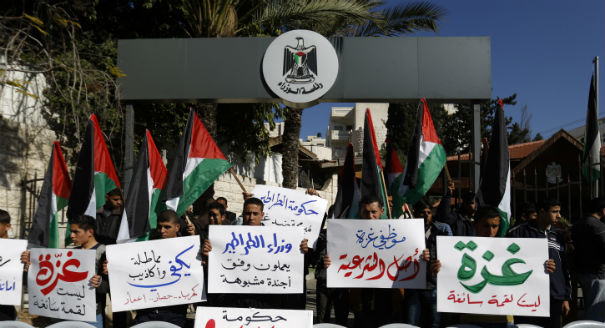The Hamas and Fatah reconciliation government has failed to offer solutions to the most pressing challenges facing Palestinians. Hamas increasingly feels that the reconciliation has not provided the lifeline it was hoping for in Gaza—its leadership and rank-and-file members cite concerns about the failure to make headway on reconstruction after the recent war, the contentious issue of government employee salaries, and security concerns over border crossings. And since the six-month mandate of the consensus government ended on December 2, Hamas may be compelled to act, but its options remain limited.
Tension with the consensus government is growing over a number of issues. Following the 2014 Israel-Gaza war, locals feel the current unity government is dragging its feet on the reconstruction process, focusing instead on administrative and bureaucratic disputes with Hamas—particularly regarding various local, regional, and international agreements to monitor the entry of building materials allowed into Gaza. For its part, Hamas feels that the slow nature of the reconstruction process is an attempt to undermine its support base and popularity in Gaza. Hamas also claims the consensus government has not helped to reach a fair settlement to open the Karam Abu Salam (Kerem Shalom) and Erez border crossings with Israel; and with the Rafah crossing mostly closed since October due to the security situation in Sinai, this has caused further isolation. Amid worsening social and economic circumstances, Hamas is concerned about unrest in Gaza, while the unity government stresses that Hamas has not allowed it to manage the situation and has instead retained its tight control over the strip.
Although Hamas has benefited from a boost in popular support following Israel’s recent war on Gaza, its control in the strip is nonetheless waning. Recent reports from Gaza indicate that members of the security forces and the police who have not been paid have stopped controlling the joint border with Israel in the east and Egypt in the south. Furthermore, the increase in union strikes in Gaza has begun to directly affect the two most vital sectors, education and health, placing further stress on the unity government to pay employees’ salaries and provide social services.
This dire situation in Gaza has only underscored Hamas’s limited policy options. If the status quo continues too long, their last resort is to renew the confrontation with Israel, which is in the interest of neither of them. Despite Hamas’s increasing use of rockets in recent weeks, Palestinians are not interested in a new war. Yet clashes on the border in recent weeks, the killing and wounding of Palestinians, the wounding of an Israeli soldier, and an exchange of rocket fire between Israel and Gaza have all increased the chances of a confrontation with Israel.
Hamas could instead push for the dismissal of the current national unity government, as its specified six-month legal term has ended, and call for the formation of a purely political government that would include members of Fatah, Hamas, the Popular Front for the Liberation of Palestine (PFLP), and the Democratic Front for the Liberation of Palestine (DFLP). Hamas hopes that such a government, more representative of the Palestinian street, would make more progress on outstanding issues. In the event that the various factions would agree on ministerial quotas, Hamas might be required to make significant concessions—such as recognizing Israel—that would render this deal a non-starter.
If unable to form a new reconciliation government—or even extend the current one—Hamas may find itself heading toward an alliance with Mohammed Dahlan, a Fatah leader with significant support in Gaza. Hamas has already insinuated that, in the absence of better alternatives, it may use this option as a key to solving Gaza’s myriad problems. Threatening to form an alliance with Dahlan—an option that would not include his rival Fatah faction in the West Bank—may allow Hamas to pressure their mutual rival Mahmoud Abbas to respond to some of the movement’s needs. Dahlan has regional connections with Egypt, the UAE, and Saudi Arabia that Hamas hopes might bring in new funds. But allying with Dahlan risks alienating many members among Hamas’s own ranks.
With so few alternatives, Hamas is likely to extend the mandate of the current consensus government while continuing to exert pressure through other channels to ensure its needs are met. In the short term, this might guarantee Hamas’s survival, but it will do little to address the overwhelming social pressures and tensions plaguing Gaza.
Adnan Abu Amer is dean of the Faculty of Arts and professor of Political Science at Al Ummah University in Gaza.
This article was translated from Arabic.




